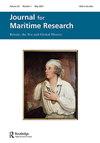Supporting the wartime economy: imperial maritime trade and the globalised maritime trade system, 1914–1916
Q3 Arts and Humanities
引用次数: 2
Abstract
ABSTRACT The British Empire depended on international trade and financial systems for survival. These depended on general peace. The Empire could not afford extended periods of military expenditure, using civil–military and economic mechanisms to avoid the costs of an army. These demanded an efficient global maritime transport system feeding a free economic market with close industry–navy and insurance market–government–navy cooperation. These required a naval system to protect global maritime trade. The outbreak of war in 1914 stopped maritime trade, requiring rapid unprecedented government intervention to restart it. From this restart, the privately run global maritime trade system began to distort, but collapse was protracted and the commercial system showed remarkable elasticity. The imperial government progressively replaced an efficient, fluid maritime trade system based on meeting commercial demand with centralised control to meet the demands of a mobilising war economy. By July 1916 this process was complete and a remarkable example of international administration across all areas of the global and domestic economy was well advanced. The resulting centralised control of global maritime trade fed multinational economic demands of war economies: yet this broad, complex, multidisciplinary event remains largely unknown.支持战时经济:帝国海上贸易和全球化海上贸易体系,1914-1916
大英帝国的生存依赖于国际贸易和金融体系。这些都取决于普遍的和平。帝国负担不起长期的军事开支,使用军民和经济机制来避免军队的费用。这就要求建立一个有效的全球海上运输系统,建立一个紧密合作的工业-海军和保险市场-政府-海军的自由经济市场。这需要一个海军系统来保护全球海上贸易。1914年战争的爆发使海上贸易中断,需要前所未有的政府迅速干预来重新启动。从这次重启开始,私人经营的全球海上贸易体系开始扭曲,但崩溃是旷日持久的,商业体系表现出了显著的弹性。帝国政府逐渐用集中控制取代了以满足商业需求为基础的高效、灵活的海上贸易体系,以满足动员战时经济的需求。到1916年7月,这一过程完成了,在全球和国内经济的所有领域都取得了良好的进展,成为国际管理的一个杰出典范。由此产生的对全球海上贸易的集中控制满足了战争经济的多国经济需求:然而,这一广泛、复杂、多学科的事件在很大程度上仍不为人所知。
本文章由计算机程序翻译,如有差异,请以英文原文为准。
求助全文
约1分钟内获得全文
求助全文
来源期刊

Journal for Maritime Research
Arts and Humanities-History
自引率
0.00%
发文量
0
期刊介绍:
The Journal for Maritime Research ( JMR ), established by the National Maritime Museum in 1999, focuses on historical enquiry at the intersections of maritime, British and global history. It champions a wide spectrum of innovative research on the maritime past. While the Journal has a particular focus on the British experience, it positions this within broad oceanic and international contexts, encouraging comparative perspectives and interdisciplinary approaches. The journal publishes research essays and reviews around 15-20 new books each year across a broad spectrum of maritime history. All research articles published in this journal undergo rigorous peer review, involving initial editor screening and independent assessment, normally by two anonymous referees.
 求助内容:
求助内容: 应助结果提醒方式:
应助结果提醒方式:


